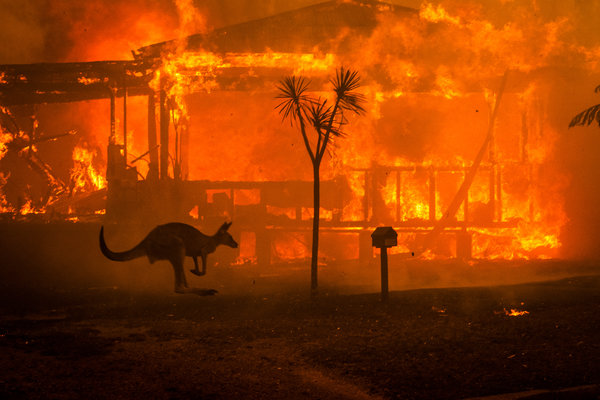Australia’s Fires and Climate Change

Moreover, the intensity of the current fire season validates scientists’ predictions: Australia’s bush fires will become more frequent and more intense as climate change worsens.
As we look back at 2019 and try to examine the year’s major events, one, and it’s a fortunate one, was that climate denial is really starting to shrivel up. Yes, if you look on Facebook, you’ll find people (or are they bots? Russians agents paid to further destroy the U.S.?) who are still active in “debate,” but this is a voice that has become so faint that it’s almost inaudible at this point.
In Australia, cattle have stopped breeding, and koala bears are dying of thirst. A few months before, the Bahamas was leveled by a hurricane with sustained wind speeds of 185 MPH, the strongest recorded storm ever to reach that nation.
We’re engaged in a desperate struggle against the clock. What happens next is anyone’s guess.

Craig,
Separating hysterical media sensationalism from reality is becoming exceedingly difficult.
In an era when a single tweet by an unidentified and unqualified individual is treated as the the same value as a reputable, verified source, dissemination of accurate information becomes very difficult.
Attributing this year’s disastrous Australian bush fires solely to “climate change” is not only disingenuous, but cruelly unhelpful.
The fires have been especially severe this year in some regions of this huge continent through a combination of factors which have nothing to do with climate change.
It may interest you to know that Koalas are not “bears” (there is no such animal as a Koala Bear!)
The Koala is a marsupial and seldom drinks water. Koala’s derive all their nutrition and hydration from the nocturnal consumption of eucalyptus leaves.
Eucalyptus trees evolved to relay on regular bush fires to propagate. The sub tropical and temperate Australian native flora is very hard on the land and soil. Most Australian flora, including native grass relies on regular fire storms to enrich the soil.
(not so good if you are and animal designed to live in a tree and sleep 18 hours a day!)
I farm in a valley surrounded by vast native mountain forests. By historical happenstance my valley has probably the largest and most varied varieties of imported Asian and European trees.
As a result, even in the worst fires, my valley and the towns doted along the river running through the centre of the valley floor, often appears as a green oasis amid a sea of a raging inferno of fire consuming the vast native forests national parks surrounding our valley.
Our valley is fire protected and enjoys it rich and productive soil thanks to the early settlers who planted imported trees and grasses.
The valley’s inhabitants also invested in Fire safety, fire prevention many decades before it became widely accepted elsewhere.
For decades the residents of our valley fought city based ideologues intent on re-planting native foliage.
I’m so very grateful each year that my own property, animals and neighbors have yet to suffer greatly from the horror of bush fires.
I share a boundary with the National forest and although we have experienced the terror of watching our mountain burn fiercely, so far all our fire prevention measures have worked and we have suffered losses of more than 10% of grassland.
My heart breaks for those Farmers and rural communities less fortunate than us who face devastation.
The severity of this years Australian fires is the result of an unusual, (but not unique) combination of weather conditions.
These conditions have been compounded by a lack of preparedness and poor enforcement of planning regulations that has seen a significant expansion of housing into high risk areas.
Even more tragically, this year a higher than normal proportion of grass and bush fires have been deliberately set ablaze by arsonists.
The tragedy of bush and grass fires is too serious a matter for cheap political jibes.